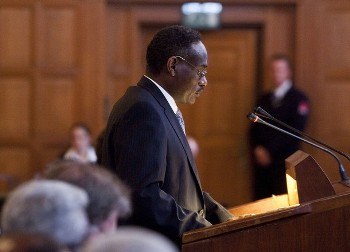Sudan seeking “Iran-style” dialogue with international community: NCP
February 1, 2014 (KHARTOUM) – The ruling National Congress Party (NCP) has adopted a dual reform track that would address both domestic and foreign issues, a senior party official said today.

Ahmed pointed to the recent decision to lift a ban on the opposition Popular Congress Party’s (PCP) newspaper, Ray al-Shaab, describing it as positive indicator in this regard.
The National Intelligence and Security Services (NISS) last week lifted a two-year suspension on the daily, but stipulated 19 conditions for the resumption of its publication, all of which were swiftly rejected by the editorial board and the party.
In an interview on government-run Radio Omdurman on Friday, the NCP official said that limits of freedoms would be defined by the current laws and constitution during which time all political forces will engage in a dialogue to draft a new consensual constitution.
He stressed that his party would exert every effort possible to provide guarantees for political forces and Sudanese people, revealing that president Omer Hassan al-Bashir will soon meet with opposition leaders to discuss major national issues and develop mechanisms to implement anything decided on.
Ahmed reiterated that the NCP seeks to engage in unconditional dialogue with opposition forces, declaring that preparations are underway for a simultaneous dialogue with the international community similar to that which is taking place between Iran and the western countries.
He said the NCP has reviewed Sudan’s foreign policy during the last 24 years in order to shape a new vision different from the previous one.
“We agreed to adopt a new foreign policy which seeks to secure the Sudanese citizen’s livelihood and safety,” he added.
The statements by the NCP official suggest a move by Khartoum to mend ties with the west and particularly the United States.
Sudan’s human rights record and its hosting of Islamic militant groups since the 1989 military coup, which brought Bashir to power, has created a rift between Khartoum and the west as well as Arab and African countries.
Over the last decade, however, the Sudanese government has managed to improve relations with several of its long-time regional foes and reduce tensions with the west particularly after signing the 2005 Comprehensive Peace Agreement (CPA), which ended Africa’s longest civil war.
But the outbreak of the Darfur conflict in 2003 and the humanitarian crisis that ensued put Sudan’s quest for normalisation of ties with the international community at a standstill. The wars that erupted later in the Blue Nile and South Kordofan states further frustrated Khartoum’s efforts.
The US has so far refused to heed to Khartoum’s demands to remove it from the list of states that sponsor terrorism or lift decade-long economic sanctions.
These sanctions have blocked Sudan access to US financial markets and prohibited US companies from trading or investing in the East African nation.
While the European Union (EU) has not followed Washington’s steps of imposing an economic embargo, European companies have also largely shunned Sudan so as not to jeopardise its dealings with the US.
Furthermore, rich Arab Gulf states and particularly Saudi Arabia have lately grown suspicious of Sudan’s links with Iran and as such have been reluctant to lend help to Khartoum, which has been suffering from a cash crunch after the secession of the oil-rich South.
Analysts also say that relief for Sudan’s hefty $45 billion debt is contingent upon the political backing of the west.
Khartoum appears to be eyeing a deal similar to one sealed last year between Iran and the West which enabled the former to secure a partial lifting of sanctions in return for Tehran curbing its nuclear programme.
But any such move may face stiff resistance from hardliners within the Islamist-backed NCP who would refuse to make concession to appease the west.
In 2012, Sudan’s foreign minister, Ali Karti, revealed that he sent a note to the presidency objecting to receiving Iranian warships and warned that this could endanger Khartoum’s relations with Arab Gulf states.
But while the government took his advice initially, it ignored it subsequently and allowed Iranian navy to dock in Port Sudan.
NO FOREIGN PRESSURES
Meanwhile, the NCP political secretary and Sudan’s investment minister, Mustafa Osman Ismail, said that Bashir’s recent address to the nation was not triggered by foreign or domestic pressures such as wars, pointing to the victories of the Sudanese army on several battle fronts.
Ismail, who addressed the closing ceremony of the second tourism and shopping festival in the River Nile state’s city of Shendi, called upon all political forces to engage in a national dialogue in order to draw a roadmap for Sudan’s future through drafting a permanent constitution.
He said the upcoming elections would be conducted in a favourable climate that meets aspirations of all political parties, adding that Bashir’s speech aimed to invite political force to participate in drafting the new constitution.
“Through joint dialogue, we would agree to develop a mechanism which contains a timeline for the meeting of all political forces in order to shape a roadmap for the future of the country,” he added
The long-awaited speech by Bashir, expected to unveil a major reform proposal, created a wave of disappointment among those who followed it including opposition leaders who were present.
Bashir announced a 4-point plan for reform “to stop the war and bring peace, free political society, fight against poverty and revitalise national identity”, calling for political forces to engage in dialogue to agree on the implementation items though he did not specify practical steps to do so.
Opposition figures who were present made statements either personally or through their parties criticising the lack of specifics and excessive generalities that gave no real signs of concessions on the part of the ruling party.
(ST)
